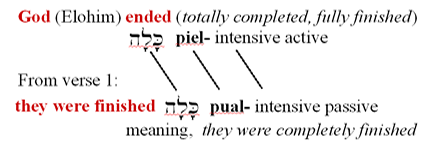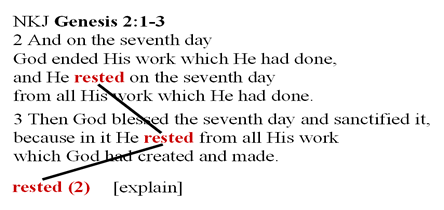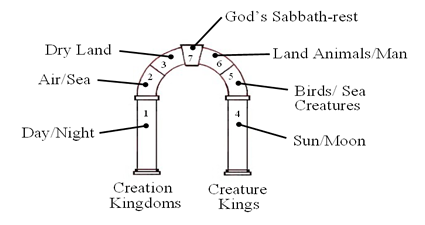The Friendly Fire Room Presents
Listen And See
Thank you Wanda Barlow for this great idea!
Genesis Framework Part 7
Genesis Framework Pt 7
Genesis Framework
GF 07 Genesis 2.1-3
Aug 9, 2015
Part 7
Scripture
Please turn to Genesis 2.1-3
NKJ Genesis 2:1-3
1 Thus the heavens and the earth,
and all the host of them, were finished.
2 And on the seventh day
God ended His work which He had done,
and He rested on the seventh day
from all His work which He had done.
3 Then God blessed the seventh day and sanctified it,
because in it He rested from all His work
which God had created and made.

NKJ Nehemiah 9:6
You alone are the LORD;
You have made heaven,
The heaven of heavens, with all their host,
The earth and everything on it,
The seas and all that is in them,
And You preserve them all.
The host of heaven worships You.
![]()
These are the invisible spiritual hosts of heaven.
NKJ Genesis 2:1-3
1 Thus the heavens and the earth,
and all the host of them, were finished.
were finished![]() pual- intensive passive meaning, they were completely finished.
pual- intensive passive meaning, they were completely finished.
NKJ Genesis 2:1-3
2 And on the seventh day God ended His work which He had done,
and He rested on the seventh day from all His work which He had done.
on the seventh day on the day, namely the seventh one
Please note the absence of the concluding “evening-morning” formula; yet it is called a “day.” This all the more advises us that these days of the creation account are meant figuratively.
The match-up leaves no doubt that the Creator is God.
NKJ Genesis 2:1-3
2 And on the seventh day
God ended His work which He had done,
and He rested on the seventh day
from all His work which He had done.
God (Elohim) ended (totally completed, fully finished)

meaning, they were completely finished
1 God (Elohim) ended (totally completed, fully finished)
![]() piel- intensive active
piel- intensive active
2 they were completely finished
![]() pual- intensive passive
pual- intensive passive
These two verses summarize the creative work of Elohim, and affirm Him as the Omega, the Finisher.
Elohim is the First- He is also the Last.
God sets forth His creative acts within the pictorial framework of a Sabbath-capped week. By this pattern He identifies Himself as the Alpha and the Omega, the One for and unto all things are and were created.
NKJ Revelation 4:11
"You are worthy, O Lord,
To receive glory and honor and power;
For You created all things,
And by Your will they exist and were created."

How exactly are we supposed to understand that
God “rested” on the seventh day? As a resting worker who has spent His strength?
No! Because the fiat character of His “six days” of work
was effortless for Him.
Rather, this “resting” is first and foremost a kind of satisfaction and delight in his work.
John Owen says,
“For God so rested from his [works] as to take the
greatest delight and satisfaction in them, to be refreshed
by them ... Ex 31:17 ... First God evaluates his work
(“very good”), then he takes delight. This is His Sabbath.” The Creator’s Sabbath rest is more a matter of taking
satisfaction and delight in the consummated building of
His cosmic-temple.
Each successive fiat by which the cosmic-house took shape, was followed by a judicial judgment, “God saw that it was good.”

God created the heavens (upper-register) and the earth (lower-register) to be His cosmic-palace and appropriately His resting is an occupying of His palace, as a new enthronement of Elohim.
The “rest of God” may be more specifically understood as a royal kind of resting, God’s enthronement above all creation; in the same manner of God’s enthronement above the ark of the covenant in earthly replication of His throne-house.
The whole creation week moves toward the climatic seventh day, the Sabbath; and in the unfolding of the significance of the Sabbath day, the Omega name of God
is disclosed. Heaven and earth were erected as a house of God, a palace of the Great King, the seat of sovereignty of
the Lord of the covenant, Yahweh. God reveals Himself as a God of the throne; that is, the
archetype (upper-register original) of God’s Sabbath rest,
or Sabbath enthronement (lower-register copy).
In the case of the original creation, Sabbath-enthronement was not preceded by conflict with rebel adversaries but came at the completion of a purely constructive process. So there could be no question of an initiation of God’s world dominion by defeat of another god who previously possessed sovereignty.
Creation produced a new theater for the manifestation of God’s eternal majesty. When God had finished creating the heavenly throne and earthly footstool, He simply assumed His rightful royal place in this new sphere.
In Isaiah, some comments echo the treatment of the theme of the Sabbath and the day of the Lord in the same context. Isaiah says, “Thus says the LORD: ‘Heaven is my throne, and the earth is my footstool; what is the house that you would build for me, and what is the place of my rest?’” (Isa 66:1).
Isa 66.1a identifies heaven and earth as God’s throne-house. Isa 66.1b the Lord asks Israel “what manner of house will you build unto Me and what shall be the place of my rest?”
Similarly in Psalm 132,
“‘Let us go to his dwelling place;
let us worship at his footstool!’
... For the LORD has chosen Zion;
he has desired it for his dwelling place:
‘This is my resting place forever; here I will dwell,
for I have desired it’” (Psa 132:7-8, 13-14).
The temple on Zion was a copy of the heaven and earth. But how does a “resting place” relate to a “seat of
enthronement”? All creation is His footstool.
His footstool![]() His throne
His throne ![]() His resting place.
His resting place.
The overall form of the creation narrative expresses His sovereignty, covenantal lordship, and that all things are unto Him.
God sets forth His creative acts within the pictorial framework of a Sabbath-capped week and by this sabbatical pattern He identifies Himself as Elohim, the First, the Alpha; and also as the Last, the Omega; the One for whom all things are and were created.
The Sabbath-enthronement of the seventh day was not the first such expression of divine enthronement within creation history. In Gen 1.2, the Glory manifestation of God over the creation while it was yet the visible heavens and earth without form and void of habitation, was the first manifestation of God’s enthronement in the midst of the heavenly hosts. So, the Sabbath rest is again the paradigm of the nature of the Spirit-Glory, as the sovereign God who protectively covers all that belongs to Him.
There is a hierarchical ordering of the topically arranged elements within the Genesis creation narrative.

What is the character of this “rest,” and how are we to supposed to understand it? As a royal kind of resting…
If the basis of God’s Sabbath-resting was not in order to recover and recuperate His strength, what kind of rest is Scripture talking about? And if the main point of God’s Sabbath-resting is not for Him to recuperate from six days of His creative work, does this framework hold any correspondence to our observation of the Sabbath?
Let’s look at the basis for God’s third Commandment…
Exodus 20:8-11
8 " Remember the Sabbath day, to keep it holy.
9 Six days you shall labor and do all your work,
10 but the seventh day is the Sabbath of the LORD
your God. In it you shall do no work: you, nor your son,
nor your daughter, nor your male servant, nor your
female servant, nor your cattle, nor your stranger who is
within your gates.
11 For in six days the LORD made
the heavens and the earth, the sea, and all that is in them,
and rested the seventh day. Therefore the LORD blessed the Sabbath day
and hallowed it.
rested A good translation would be, “to repose” The idea being to pause, to give time for reflection. God sat back and reflected on His work and said that it
was very good!
Notice the result; God blessed it (gave His approval of it)
and hallowed it (set it apart as holy). Obviously God intended His Sabbath-rest to continue
way beyond that one “day” after the original Creation. The Sabbath Day is not Saturday as it was in the OT,
but Sunday— The Lord’s Day, for on it, Jesus proved himself to be
God, Lord of the Sabbath.
In the NT, Stephen talks about Isaiah saying,
“Yet the Most High does not dwell in houses made by
hands, as the prophet says, ‘Heaven is my throne, and the
earth is my footstool. What kind of house will you build
for me, says the Lord, or what is the place of my rest?
Did not my hand make all these things?’” (Acts 7:48-50).
Ephesians 1.20-23 says that God- “worked in Christ when he raised him from the dead and
seated him at his right hand in the heavenly places,
far above all rule and authority and power and dominion,
and above every name that is named, not only in this age
but also in the one to come. And he put all things under his feet and gave him as head
over all things to the church” (Eph 1:20-23).
This complex passage puts God working, Christ being seated, rule, dominion, and a citation from Psalm 8 together in Christ, the One eternally enthroned.
Are you starting to sense what’s going on as Christ is presently seated?
For Christ “to be seated” is for Christ to be at “rest.”
It is identical to what God is doing in Genesis 2:2-3.In the language of Hebrew, for the king “to rest” and for the king “to take his seat on the throne” are the same thing.
Many will be surprised on the Day of Judgment when they discover that it was just as the Word of God says; only the righteousness of Christ is able to save you.All men are sinners and no one can save himself. God is just, so He must punish sin; but He is also merciful, moreover gracious, and offers His Son as the perfect sacrifice in order to purchase a place for you in heaven, which He offers to you as the free gift of eternal life.
Jesus is God Incarnate
In order to pay the debt of our sins, He came from Heaven, having been sent by the Father, where He lived a life of perfect obedience to the Father even unto the shameful death upon the cross in order to pay the debt of your sins.This gift must be received by faith, believing that Jesus’ perfect life and Cross Work was His complete and necessary Atonement for your sins, in your behalf.Faith is a gift that comes by the Power of God the Holy Spirit working in a person’s innermost being. The Holy Spirit has the authority and power to quicken your dead spirit, to make it come to life. If you have not done so before this moment, ask Jesus to forgive you your sins, tell Him you’ve stop trying to be your own savior, and ask Him to come into your life right now, and to give you eternal life. Then, in faith believing, thank Him for the gift that He is giving you, the one He paid for in full in your place, in Jesus’ name,AMEN
Bibliography
Agnes, Michael and Charlton Laird (eds.). Webster’s New World Dictionary and Thesaurus. New York, NY: Macmillan, 1996.
Aland, Kurt, Matthew Black, Carlo M. Martini, Bruce M. Metzger, and Allen Wikgren (eds.). The Greek New Testament, 4th rev. ed. Germany: Biblica-Druck, 1994.
Benner, Jeff A. The Ancient Hebrew Lexicon of the Bible. College Station, Texas: Virtualbookworm.com Publishing Inc., 2005
Bullinger, E. W. Figures of Speech Used in the Bible; Explained an Illustrated. Grand Rapids, Michigan: Baker Book House, 2007.
Chapman, Benjamin. Greek New Testament Insert. Grand Rapids, Michigan: Baker Book House, 1977.
Dana, H. E., and Julius R. Mantey. A Manual of the New Testament. Canada: The Macmillan Company, 1957.
Louw, Johannes P. and Eugene A. Nida. Greek-English Lexicon of the New Testament Based on Semantic Domains. New York, NY: United Bible Societies, 1989.
The ESV Study Bible. Wheaton, Illinois: Crossway, 2011.
Metzger, Bruce M. Lexical Aids for Students of New Testament Greek. Princeton, New Jersey, 1977.
Wikipedia contributors. "Xenophon." Wikipedia, The Free Encyclopedia. Wikipedia, The Free Encyclopedia, 15 Aug. 2014. Web. 19 Aug. 2014.
Wuest, Kenneth S. The New Testament; An Expanded Translation. Grand Rapids, Michigan, 1992.
Wuest, Kenneth S. (Revised, Donald L. Wise). The Practical Use of the Greek New Testament, rev. ed. Chicago, Il: Moody Press, 1982.
Walsh, J. Martyn and Anna Kathleen Walsh. Plain English Handbook: A Complete Guide to Good English, 7th rev. ed. Cincinnati, Ohio: McCormick-Mathers PublishingCompany,1977.
Copyright August, 2015
Rev. Jim Craig
All Rights Reserved